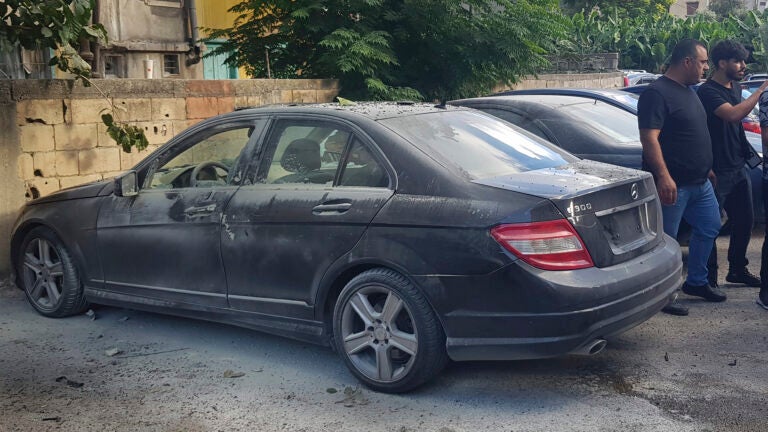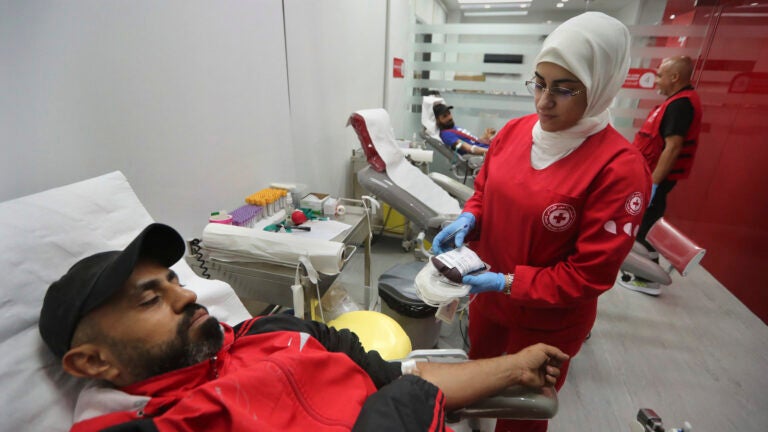World News
Several blasts were heard at the funeral in Beirut for three Hezbollah members and a child killed by exploding pagers the day before, according to Associated Press journalists at the scene.
BEIRUT (AP) — Explosions went off in Beirut and multiple parts of Lebanon in an apparent second wave of detonations of electronic devices, Hezbollah officials and state media said Wednesday, reporting walkie-talkies and even solar equipment detonating a day after hundreds of pagers blew up. At least one person was killed and more than 100 people wounded, the Health Ministry said.
Several blasts were heard at the funeral in Beirut for three Hezbollah members and a child killed by exploding pagers the day before, according to Associated Press journalists at the scene. An AP photographer in the southern coastal city of Sidon saw a car and a mobile phone shop damaged after devices exploded inside of them.
A Hezbollah official told the AP that walkie-talkies used by the group exploded. The official spoke on condition of anonymity because he was not authorized to speak to the media. Lebanon’s official news agency reports that solar energy systems exploded in homes in several areas of Beirut and in southern Lebanon, wounding at least one girl.
The new blasts hit a country still thrown into confusion and anger after Tuesday’s pager bombings, which appeared to be a complex Israeli attack targeting Hezbollah members that caused civilian casualties, too. At least 12 people were killed, including two children, and some 2,800 people wounded as hundreds of pagers used by Hezbollah members began detonating wherever they happened to be — in homes, cars, at grocery stores and in cafes.
In the first wave of bombings, it appeared that small amounts of explosives had been hidden in the thousands of pagers delivered to Hezbollah and remotely detonated. The reports of further electronic devices exploding suggested even greater infiltration of boobytraps into Lebanon’s supply chain. It also deepens concerns over the attacks in which hundreds of blasts went off in public areas, often with many bystanders, with no certainty of who was holding the rigged devices.
The attacks, which Israel has not commented on, renewed fears that the simmering conflict between Israel and Hezbollah could escalate into all-out war. Secretary of State Antony Blinken said Wednesday the U.S. is still assessing how the attack could affect efforts to negotiate a cease-fire in the Israel-Hamas war in Gaza.
Israel began moving more troops to its border with Lebanon on Wednesday as a precautionary measure, according to an official with knowledge of the movements who spoke on condition of anonymity because he was not authorized to speak to the media.
Hezbollah and Israeli forces have exchanged fire almost daily since Oct. 8, the day after a deadly Hamas-led assault in southern Israel triggered the war. Since then, hundreds have been killed in the strikes in Lebanon and dozens in Israel, while tens of thousands on each side of the border have been displaced. Hamas and Hezbollah are allies and both are supported by Iran. Israeli leaders have issued a series of warnings in recent weeks that they might increase operations against Hezbollah in Lebanon, saying they must put a stop to the exchanges to allow people to return to homes near the border.
New details on the operation began to emerge. An American official said Israel briefed the United States after the attack, in which small amounts of explosive had been hidden in the pagers. The person spoke on the condition of anonymity because they were not authorized to discuss the information publicly.
The pagers were made by a company based in Hungary, another firm said Wednesday.
The AR-924 pagers used in Tuesday’s attack were manufactured by BAC Consulting KFT, which is based in the Hungarian capital of Budapest, according to a statement released by Gold Apollo, a Taiwanese firm that authorized the use of its brand on the pagers.
Gold Apollo’s chair, Hsu Ching-kuang, told journalists Wednesday the firm has had a licensing agreement with BAC for the past three years.
“According to the cooperation agreement, we authorize BAC to use our brand trademark for product sales in designated regions, but the design and manufacturing of the products are solely the responsibility of BAC,” Gold Apollo said in a statement.
BAC Consulting Kft. was registered as a limited liability company in May 2022, according to its records. It has 7,840 euros in standing capital, the records showed, and had revenue of $725,768 in 2022 and $593,972 in 2023.
At the headquarters of a building in a residential neighborhood of Budapest, the names of multiple companies, including BAC Consulting, are posted on pieces of paper on a window.
A woman who emerged from the building and declined to give her name said the site provides headquarter addresses to various companies.
BAC’s parent company is registered to Cristiana Rosaria Bársony-Arcidiacono, whose describes herself on her LinkedIn page as a strategic advisor and business developer. Among other positions, Bársony-Arcidiacono says on the page that she has served on the board of directors of the Earth Child Institute, a sustainability group. The group does not list Bársony-Arcidiacono as among its board members on its website.
The Associated Press has attempted to reach Bársony-Arcidiacono via the LinkedIn page and has been unable to establish a connection between her or BAC and the exploding pagers.
The attack in Lebanon started Tuesday afternoon, when pagers in their owners’ hands or pockets started heating up and then exploding — leaving blood-splattered scenes and panicking bystanders.
It appeared that most of those hit were members or linked to members of Hezbollah — whether fighters or civilians — but it was not immediately clear if people with no ties to Hezbollah were also hit.
The Health Ministry said health care workers and two children were among those killed. In the village of Nadi Sheet in the Bekaa Valley, dozens gathered to mourn the death of one of the children, 9-year-old Fatima Abdullah.
Her mother, wearing black and donning a yellow Hezbollah scarf, wept alongside other women and children as they gathered around the little girl’s coffin before her burial.
Hezbollah said in a statement Wednesday morning that it would continue its normal strikes against Israel as part of what it describes as a support front for its ally, Hamas, and Palestinians in Gaza.
“This path is continuous and separate from the difficult reckoning that the criminal enemy must await for its massacre on Tuesday,” it said. “This is another reckoning that will come, God willing.”
At hospitals in Beirut on Wednesday, the chaos of the night before had largely subsided, but relatives of the wounded continued to wait.
Lebanon Health Minister Firas Abiad told journalists during a tour of hospitals Wednesday morning that many of the wounded had severe injuries to the eyes, and others had limbs amputated. Journalists were not allowed to enter hospital rooms or film patients.
Abiad said the wounded had been sent to various area hospitals to avoid any single facility being overloaded and added that Turkey, Iraq, Iran, Syria and Egypt offered to help treat the patients.
Earlier Wednesday, an Iraqi military plane landed in Beirut carrying 15 tons of medicine and medical equipment, he said.
Experts believe explosive material was put into the pagers prior to their delivery.
The AR-924 pager, advertised as being “rugged,” contains a rechargeable lithium battery, according to specifications advertised on Gold Apollo’s website before they were removed after the attack.
It claimed to have up to 85 days of battery life. That would be crucial in Lebanon, where electricity outages have been common after years of economic collapse. Pagers also run on a different wireless network than mobile phones, making them more resilient in emergencies — one of the reasons why many hospitals worldwide still rely on them.
For Hezbollah, the pagers also provided a means to sidestep what’s believed to be intensive Israeli electronic surveillance on mobile phone networks in Lebanon.
“The phone that we have in our hands — I do not have a phone in my hand — is a listening device,” warned Hezbollah chief Hassan Nasrallah in a February speech.
Taiwan’s Ministry of Economic Affairs said from the beginning of 2022 until August 2024, Gold Apollo has exported 260,000 sets of pagers, including more than 40,000 sets between January and August of this year. The ministry said that it had no records of direct exports of Gold Apollo pagers to Lebanon.
Spike reported from Budapest and Lai from Taipei, Taiwan. Associated Press journalists Abby Sewell and Kareem Chehayeb in Beirut; Simina Mistreanu in Taipei; Melanie Lidman and Josef Federman in Jerusalem; Zeke Miller in Washington; and Jon Gambrell in Dubai, United Arab Emirates, contributed to this report.
Extra News Alerts
Get breaking updates as they happen.

